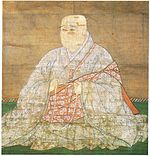Emperor Go-Shirakawa, Date of Birth, Place of Birth, Date of Death
TweetEmperor Go-Shirakawa
Emperor of JapanAbout Emperor Go-Shirakawa
- Emperor Go-Shirakawa (????? Go-Shirakawa-tenno) (October 18, 1127 – April 26, 1192) was the 77th emperor of Japan, according to the traditional order of succession.
- His de jure reign spanned the years from 1155 through 1158, though arguably he effectively maintained imperial power for almost thirty-seven years through the insei system - scholars differ as to whether his rule can be truly considered part of the insei system, given that the Hogen Rebellion undermined the imperial position.
- However, it is broadly acknowledged that by politically outmaneuvering his opponents, he attained greater influence and power than the diminished authority of the emperor's position during this period would otherwise allow. Posthumously, this 12th-century sovereign was named after the 11th-century Emperor Shirakawa.
- Go- (?), translates literally as "later"; and thus, he is sometimes called the "Later Emperor Shirakawa", or, in some older sources, may be identified as "Shirakawa, the second" or as "Shirakawa II. Unusually, the years of Go-Shirakawa's reign are more specifically identified by more than one era name or nengo; Kyuju (1154–1156) and Hogen (1156–1159).He was de facto the last absolute monarch, before the shogun became the actual head of the country for almost seven centuries, until 1868.
Read more at Wikipedia


 Date of Birth:
Date of Birth:  Place of Birth: Kyoto, Kyōto Prefecture, Japan
Place of Birth: Kyoto, Kyōto Prefecture, Japan